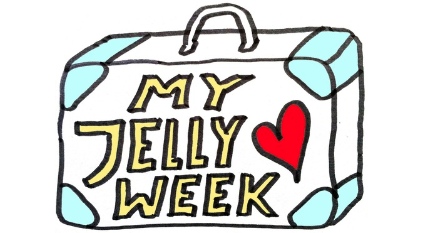This week is JellyWeek, a celebration of global coworking, connections and collaboration on a local level. So if you haven’t yet visited your local Jelly meet-up, now could be the perfect time to do it.
Jelly is a regular, free ‘work-together’ that was started in New York City back in 2006, and has been gaining steam ever since. It was kicked off by two IT freelancers who worked from home, and who – like most homeworkers – were getting tired of the same four walls. They realised it would be much more fun and productive if they could work with other people, namely by getting together in one place with free Wi-Fi, good coffee and chat on-tap. So, Jelly was born.
In essence, Jelly is free coworking. And just like the coworking movement, Jelly is all about getting people together to gain inspiration, enjoy like-minded company and escape the loneliness of the home office space. It’s a way of connecting people and collaborating which, as we all know, is the new language of workspace – and it’s taking the world of commercial property by storm.
Now Jelly is flexing its coworking muscles and taking things a step further. This week it’s JellyWeek, which means freelancers, mobile workers and homeworkers all over the world are getting together to connect, chat, collaborate and cowork.
With thousands of participants and over 200 hosts from 37 countries in 6 continents taking part, it’s a huge undertaking. And it’s certainly global. But it’s also a local event for local communities – hence the term ‘glocal’. According to Anni Roolf and Leila País de Miranda, the two women behind Jellyweek 2013, it’s a “week-long, decentralized event aiming to establish connections and form cross communal networks”.
In short, it’s all about supporting global action at a local level.
There are no rules, except that JellyWeek should be free and open to the public. “We want to empower people to do what they want and set people free,” said Anni, speaking via the DeskMag blog. “We want to provide the platform for connections to be made… and introduce totally different networks,” she said.
This is what coworking is all about, and it’s what Jelly does best. It’s a great way of introducing lonely workers and independent professionals to a new way of working, and it’s helping to raise the awareness of coworking and local workspaces too. For instance, many coworking locations are offering free space throughout the week, along with various workshops, seminars, knowledge sharing days and social events.
Here at Officing Today we have been tracking the progress of the humble Jelly. We even tried it out as part of our coworking experiment and reported on the pros and cons (needless to say, there were many more pros than cons).
Business centre operators have much to learn from JellyWeek. Could your workspace or business centre get in on the act by offering free workspace for a day or two during JellyWeek? Taking it a step further, why not host a fortnightly or monthly Jelly? After all if you’ve got a spacious communal or hot-desking area with Wi-Fi, why not? You’ll be doing a good turn for your community by providing a stimulating environment for local workers. On top of that you’ll generate some great PR and you’ll raise the profile of your business centre too. In our age of coworking and collaboration, it’s certainly worth a go. What have you got to lose?



 Dr. Gleb Tsipursky – The Office Whisperer
Dr. Gleb Tsipursky – The Office Whisperer Nirit Cohen – WorkFutures
Nirit Cohen – WorkFutures Angela Howard – Culture Expert
Angela Howard – Culture Expert Drew Jones – Design & Innovation
Drew Jones – Design & Innovation Jonathan Price – CRE & Flex Expert
Jonathan Price – CRE & Flex Expert











